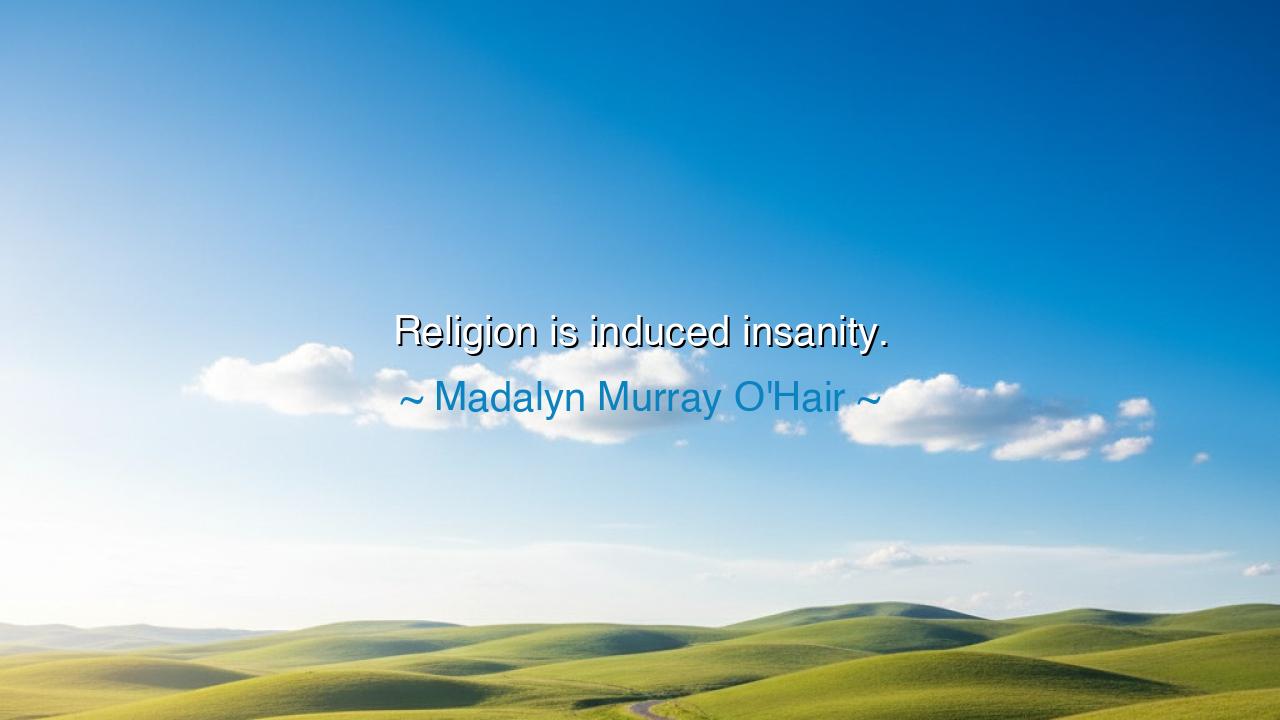
Religion is induced insanity.






The words of Madalyn Murray O’Hair—“Religion is induced insanity.”—strike with the force of fire against stone. They are not gentle musings, but a battle cry, born from a life spent in defiance of the established order. In this utterance, she sought to strip away the sacred veils and confront society with her conviction that religion, far from liberating the mind, ensnares it, shaping thought and action into patterns of bondage. Her words may sound harsh, yet they carry the passion of one who believed she was tearing down illusions for the sake of truth.
The origin of this fierce proclamation is found in O’Hair’s role as one of the most outspoken atheists of the twentieth century. She is remembered most for her part in the landmark case Murray v. Curlett, which helped remove mandatory prayer and Bible reading from public schools in the United States. To her, organized religion was not merely a harmless tradition, but a force that clouded reason, demanded conformity, and manipulated the hearts of men. By calling it “induced insanity,” she declared that faith is not a natural instinct, but a cultivated madness—passed down, taught, and enforced until it possesses the mind like a fever.
Her voice echoes against the long history of human conflict, where religion has been used not only to inspire compassion, but also to justify wars, persecutions, and inquisitions. One need only remember the burning of heretics in medieval Europe, or the bloody Thirty Years’ War, to see how fervent belief can drive nations into chaos. To O’Hair, such spectacles proved her case: what else could it be but insanity, when men, claiming to serve the divine, slaughter their neighbors in the name of heaven?
Yet we must also understand that O’Hair’s cry is not the only voice in the story of humanity. Where she saw madness, others have seen meaning. Where she saw delusion, others found hope. Think of Francis of Assisi, who abandoned wealth and power to embrace a life of service, driven by a vision of divine love. To some, he was mad; to others, he was saint. The same fire that O’Hair condemned as insanity has also produced acts of immense compassion and courage. Thus, her words force us to wrestle with the dual-edged nature of religion: it can enslave, yes, but it can also inspire.
What then is the wisdom we should draw? It is this: do not accept belief blindly, nor reject it blindly. O’Hair’s warning calls us to test every creed, to examine whether it frees the soul or chains it, whether it brings sanity or madness. For the danger is real—when religion is wielded as a weapon, when it demands obedience without question, when it blinds rather than enlightens, then truly it becomes induced insanity. Yet when it is lived as love, humility, and service, it may be not madness, but wisdom clothed in mystery.
The lesson for us is balance: be vigilant against the forces of manipulation, whether they come in robes of faith or cloaks of reason. Do not allow yourself to be swept by the madness of the crowd, whether in the temple or in the square. Cultivate a mind that questions, a heart that discerns, and a spirit that honors truth above all. Remember that O’Hair’s defiance, though controversial, was also a call for independence of thought, for freedom from coercion.
Practically, let each person examine their own life. Ask: do my beliefs—religious or not—make me more compassionate, more just, more humane? Or do they make me rigid, hostile, and blind? Do I follow because I am compelled, or because I have chosen with open eyes? In these questions lies the safeguard against the “insanity” that O’Hair warned of.
Thus, her words, though sharp and unsettling, remain a torch for those who seek to live awake rather than asleep. Whether one agrees with her or not, the teaching is clear: beware of any path, religious or secular, that steals your reason and robs your freedom. Stand firm, question boldly, and live by convictions tested in the fire of truth. For only then can one avoid the madness of induced belief and walk instead in the clarity of a mind truly free.






AAdministratorAdministrator
Welcome, honored guests. Please leave a comment, we will respond soon